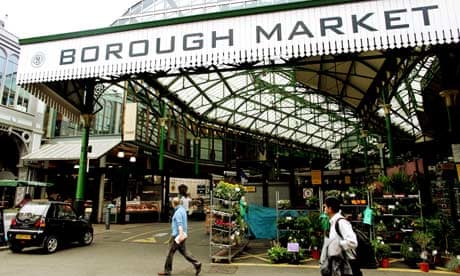In recent years Borough Market in Southwark, London, has not always been attracting the right sort of press. Wrangles over leaseholds, rent increases and a climate of fear among traders have all had an airing in the national media. More recently still, seven long-term traders, myself included, were told they could no longer trade at the market. But what exactly had been our crime?
About four years ago Monmouth Coffee shop – one of the leading retailers at Borough Market – relocated their coffee roasting to a railway arch in Bermondsey. Around the same time Neal's Yard Dairy took on some railway arches close by to mature and ripen cheese. Before long, BM traders such as ourselves – The Borough Cheese Company – began to rent railway arches in the vicinity. The attraction of these spaces depended on the business. But they had obvious advantages. They were large, uncluttered spaces, easily accessible for deliveries and they were cool (temperature-wise, not in their demeanour).
After a while Monmouth opened their tasting room under the arches and sold coffee beans and drinks on a Saturday morning. Between the hours of 9am and 2pm, there is now a thriving trading district selling top quality produce. It is known as "Maltby Street" (even though only Monmouth has a shop there).
The first I knew that something serious might be up was on the day before the royal wedding. I received an email with an attached article from a publication called the Fine Food Digest. Although the article itself was benignly well-balanced the headline proclaimed "Market rivals give Borough food for thought". The implication was clear: those of us who had relocated to the Maltby Street area did so in direct competition to BM.
Visiting Glenis Reagon, the market's managing director, I assured her that the reasons for being in Maltby Street were for storage and production (I had made three 10kg Cheshire cheeses); further, Maltby Street was not a market; we were not out to court the press at the expense of BM. Reagon made it clear that anyone criticising BM while benefiting from its trade was being disloyal. I agreed, but maintained that nobody from Maltby Street was guilty of this.
The next evening Topolski (a Polish sausage stall) had been told to cease trading at BM. By the following Tuesday we became the seventh trader to be evicted. All of us had been issued our marching orders over the phone by Reagon. None of us has had anything in writing.
We are now told that because we trade too close to the BM we undermine the market's "uniqueness" in the locality. In the Guardian earlier this week Peter Wilkinson was quoted as saying he wants "to offer people products that are unique and not available elsewhere a few steps away". Someone should tell him Maltby Street is nearly a mile from BM, while he can buy Rabot Estates chocolates in London Bridge station, literally "a few steps away".
What the last month has taught me is how precarious life as a market trader can be. It's probably fair to say most markets in this country are run by the council. Traders will operate under licence and depending on the terms of that licence will have rights to sell a specified commodity on particular days, at a particular pitch site. Borough Market is different. For a start the land is held in trust, so, in effect, is private. The Borough Market determines the status under which traders operate.
For casual traders like us, there are no contracts or licenses, merely a signature agreeing to obey the market bylaws. But what has been most striking over recent years is the increasingly aggressive style of management and a bemusing inclination to corporate-speak (traders at Borough Market are spoken of as belonging to the Borough Market "family"). Decisions are made without due consultation. Action is taken uncoupled from rationale. In short, management is perceived as increasingly autocratic and remote.
So what now? The traders still there that I've spoken to are as mystified as the ones that have been evicted. More than that, some are seeing a drop-off in trade. One trader told me that early on Saturday morning, when he'd expect to get the big shoppers getting their groceries for the week, takings were down 50%. Others have spoken of the life sucked out of the Jubilee Market (that part of the market where most of us were). All in all, the loss of seven experienced traders is not readily replaced. It would be all too easy to fill the spaces we've vacated but any diminution in quality would have long-term impact on the Borough "brand".
Borough Market has a reputation for being expensive. As long as the price is commensurate with the quality then it's fine. If you break that link, you lose trust and all the reputation in the world will not help to bring it back again.
